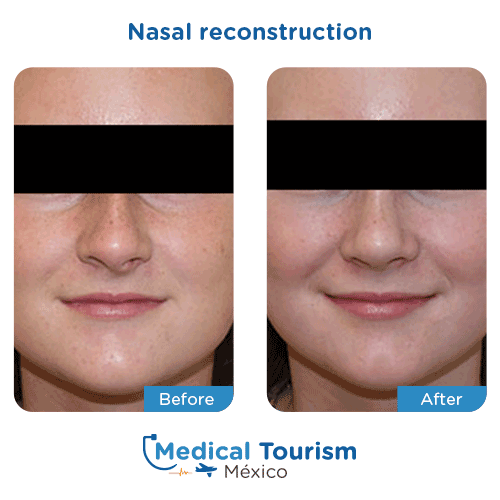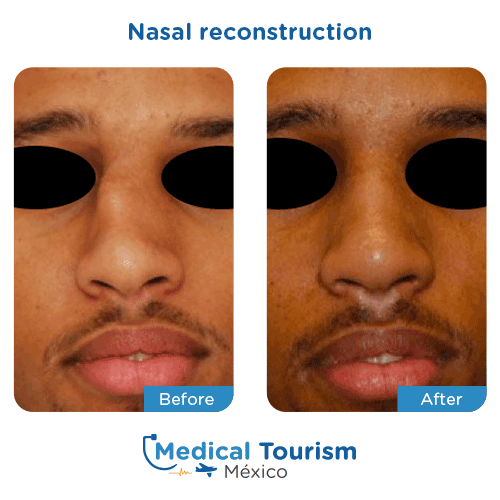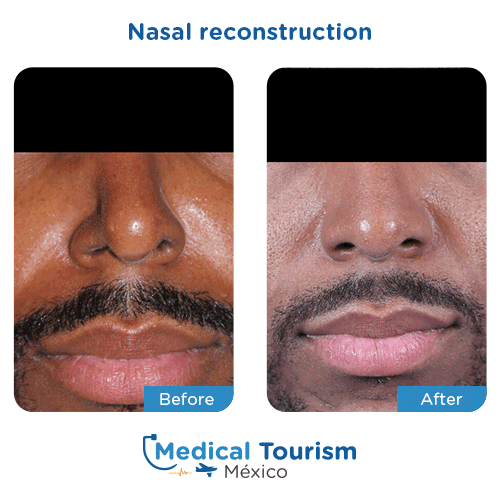The most reliable doctors in Mexico
Nasal reconstruction information and locations in Mexico
Nasal reconstruction helps restore the function and appearance of the nose after cancer removal,
trauma, or congenital defects. This surgery is different from a Septoplasty or nose job.
Before the procedure, your ENT surgeon will determine the damage, location, and structure of the
area to be reconstructed. During a nasal reconstruction, one or more procedures can be involved
to help restore the appearance and maintain the proper airflow.
Skin graft
This method is used to repair larger areas and the surrounded skin can’t be stretched to
cover the issue. The graft is obtained from another part of the patient’s body usually
from behind the ear, thigh, or groin.
Bone reconstruction
Bone reconstruction is considered when the nose presents structural deficiencies and the
cartilage or bone may need to be replaced. The cartilage can be collected from the ears,
nasal septum, or ribs, while the bone is obtained from the jaw, hips, ribs, or skull.
Nasal valve reconstruction
Nasal valve reconstruction is used to repair a collapsed cartilage in the nasal valve.
During the procedure, the cartilage is reinforced and placed back in its place.
Surgical approach for nasal reconstruction
Close surgery
On close surgery or close approach, the incisions are made inside the nostrils. Your ENT
surgeon will make the necessary modifications through these incisions.
Open surgery
During the open surgery or open approach, the incisions are made in the skin between the
nostrils. Then, your ENT surgeon will lift the skin to modify the nasal bone or
cartilage.
Schedule a nasal reconstruction with the best otolaryngologists in Mexico!
Benefits
Permanent solution
Improves breathing
Restores appearance
Improves breathing
Restores appearance
Nasal reconstruction
Procedure:
3 hrs.
Hospital stay: 4 hrs.
Cleared to fly: 10 days
Hospital stay: 4 hrs.
Cleared to fly: 10 days
After surgery
Out of town patients’ follow-ups are scheduled with the ENT surgeon after 3 and 7 days of nasal reconstruction
surgery. Patients are clear for flying after 10 days of the nasal reconstruction surgery.
Note: Follow-ups can be arranged as face-to-face or virtually. If needed, you can go to your primary care physician to remove sutures or get medication adjustments.
As an Amazon Associate, we earn from qualifying purchases.
Take a look at one of our medical tourism essentials for ENT surgery.
Take a look at one of our medical tourism essentials for ENT surgery.
Additional images
View additional images for this procedure.
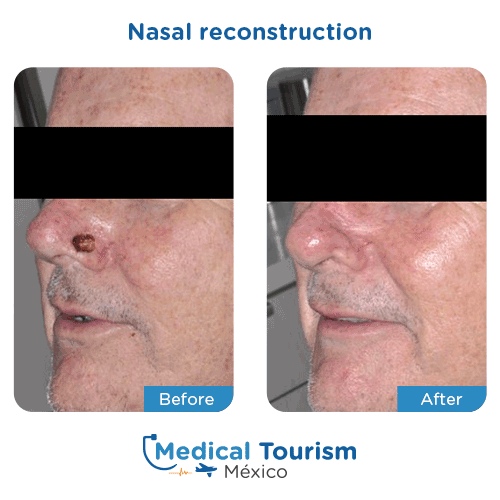
View more
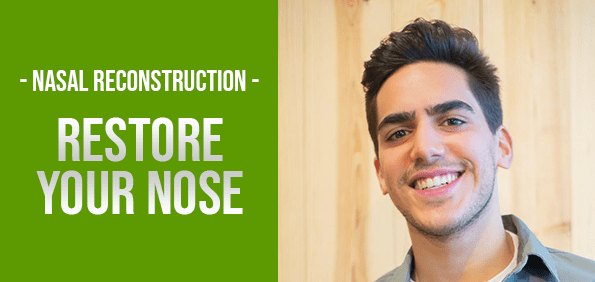

Locations
Select the city of your choice to seethe doctors profile.
Cancún, Q. Roo.
Dra. María F. Medrano
View more

Nasal reconstruction frequent questions
Get answers to our most frequently asked questions and what to expect after the procedure.
Which surgery do I need?
Not all cases are suitable for the same type of procedure and depends on the type of reconstruction you need. Your ENT surgeon will do an evaluation to determine which surgery is best for you.
How do I prepare for a nasal reconstruction surgery?
Your otolaryngologist will perform a physical examination before the procedure, you will be asked to not eat or drink at least 8 hours before the procedure. Tell your surgeon If you’re taking medications or supplements.
What can I expect during recovery?
Recovery is slow, gradual and the results may not be apparent from 6 to 12 months. After surgery, you’ll need to come back to your surgeon or an ENT surgeon to have your sutures or splint removed.
What’s the difference between a nasal reconstruction and rhinoplasty?
During a rhinoplasty, the ENT surgeon reshapes and reconstructs the bone, cartilage and skin to improve the function and appearance of the nose, while a nasal reconstruction helps to restore the appearance of the nose after cancer, trauma or congenital defects.
Recent news
Disclaimer: This information does not reflect the medical advice from our clinics. All cases are different and this treatment may not suit you. Always refer to a medical professional with the certification and experience. All of our physicians are fully qualified to perform these procedures. For more information and diagnosis contact one of our top specialized clinics.
In all medical procedures, there are chances of complications, the specialist will provide you detailed information about the risks of the procedure, talk to the specialist directly.
In all medical procedures, there are chances of complications, the specialist will provide you detailed information about the risks of the procedure, talk to the specialist directly.

